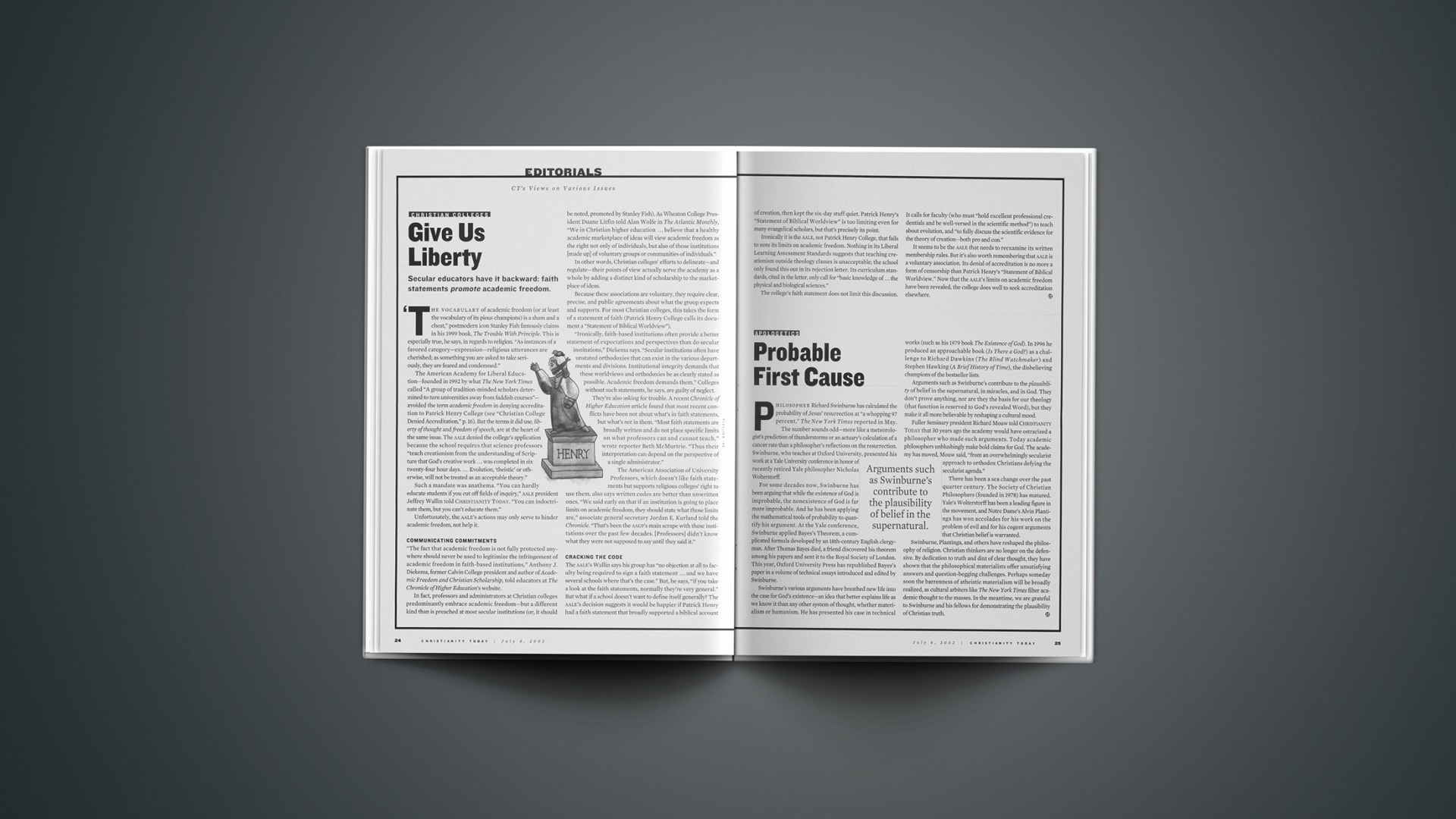Philosopher Richard Swinburne has calculated the probability of Jesus’ resurrection at “a whopping 97 percent,” The New York Times reported in May. The number sounds odd-more like a meteorologist’s prediction of thunderstorms or an actuary’s calculation of a cancer rate than a philosopher’s reflections on the resurrection. Swinburne, who teaches at Oxford University, presented his work at a Yale University conference in honor of recently retired Yale philosopher Nicholas Wolterstorff.
For some decades now, Swinburne has been arguing that while the existence of God is improbable, the nonexistence of God is far more improbable. And he has been applying the mathematical tools of probability to quantify his argument. At the Yale conference, Swinburne applied Bayes’s Theorem, a complicated formula developed by an 18th-century English clergyman. After Thomas Bayes died, a friend discovered his theorem among his papers and sent it to the Royal Society of London. This year, Oxford University Press has republished Bayes’s paper in a volume of technical essays introduced and edited by Swinburne.
Swinburne’s various arguments have breathed new life into the case for God’s existence-an idea that better explains life as we know it than any other system of thought, whether materialism or humanism. He has presented his case in technical works (such as his 1979 book The Existence of God). But more recently, he produced an approachable book (Is There a God? 1996) as a challenge to Richard Dawkins (The Blind Watchmaker) and Stephen Hawking (A Brief History of Time), the disbelieving champions of the bestseller lists.
Arguments such as Swinburne’s contribute to the plausibility of belief in the supernatural, in miracles, and in God. They don’t prove anything, nor are they the basis for our theology (that function is reserved to God’s revealed Word), but they make it all more believable by reshaping a cultural mood.
Fuller Seminary president Richard Mouw told CHRISTIANITY TODAY that 30 years ago the academy would have ostracized a philosopher who made such arguments. Today academic philosophers unblushingly make bold claims for God. The academy has moved, Mouw said, “from an overwhelmingly secularist approach to orthodox Christians defying the secularist agenda.”
There has been a sea change over the past quarter century. The Society of Christian Philosophers (founded in 1978) has matured. And the group’s mutual encouragement and rigorous criticism has borne much fruit. Yale’s Wolterstorff has been a leading figure in the movement, along with Notre Dame’s Alvin Plantinga.
Writing in CT last year, Regent College’s John Stackhouse called Plantinga “not just the best Christian philosopher of his time” but “the most important philosopher of any stripe” (“Mind over Skepticism,” June 11, 2001). Plantinga won such accolades for his work on the problem of evil and for his cogent arguments that Christian belief is warranted.
Others have also made serious contributions to the plausibility of Christian belief. Physicist-priest John Polkinghorne is among them. This “bottom-up apologist,” wrote Eastern Nazarene University’s Karl Giberson, brings his scientific mind to bear on the key Christian ideas of in the creeds and finds them not only believable on the basis of evidence, but intellectually satisfying as well (CT, May 21, 2002).
Swinburne, Plantinga, and others have reshaped the philosophy of religion. Christian thinkers are no longer on the defensive. By dedication to truth and dint of clear thought, they have shown that the philosophical materialists offer unsatisfying answers and question-begging challenges. Perhaps someday soon, the barrenness of atheistic materialism will be broadly realized as cultural arbiters like The New York Times filter academic thought to the masses. In the meantime, we are grateful to Swinburne and his fellows for demonstrating the plausibility of Christian truth.
Copyright © 2002 Christianity Today. Click for reprint information.
Related Elsewhere
In the May New York Times article, “So God’s Really in the Details?,” Swinburne is quoted saying, “For someone dead for 36 hours to come to life again is, according to the laws of nature, extremely improbable. But if there is a God of the traditional kind, natural laws only operate because he makes them operate.”
Swinburne’s books The Existence of God, Is There a God? and more are available at Christianbook.com.
Last year, John G. Stackhouse, Jr. wrote in Christianity Today that Alvin Plantinga “is not just the best Christian philosopher of his time. No, Plantinga is the most important philosopher of any stripe.”










